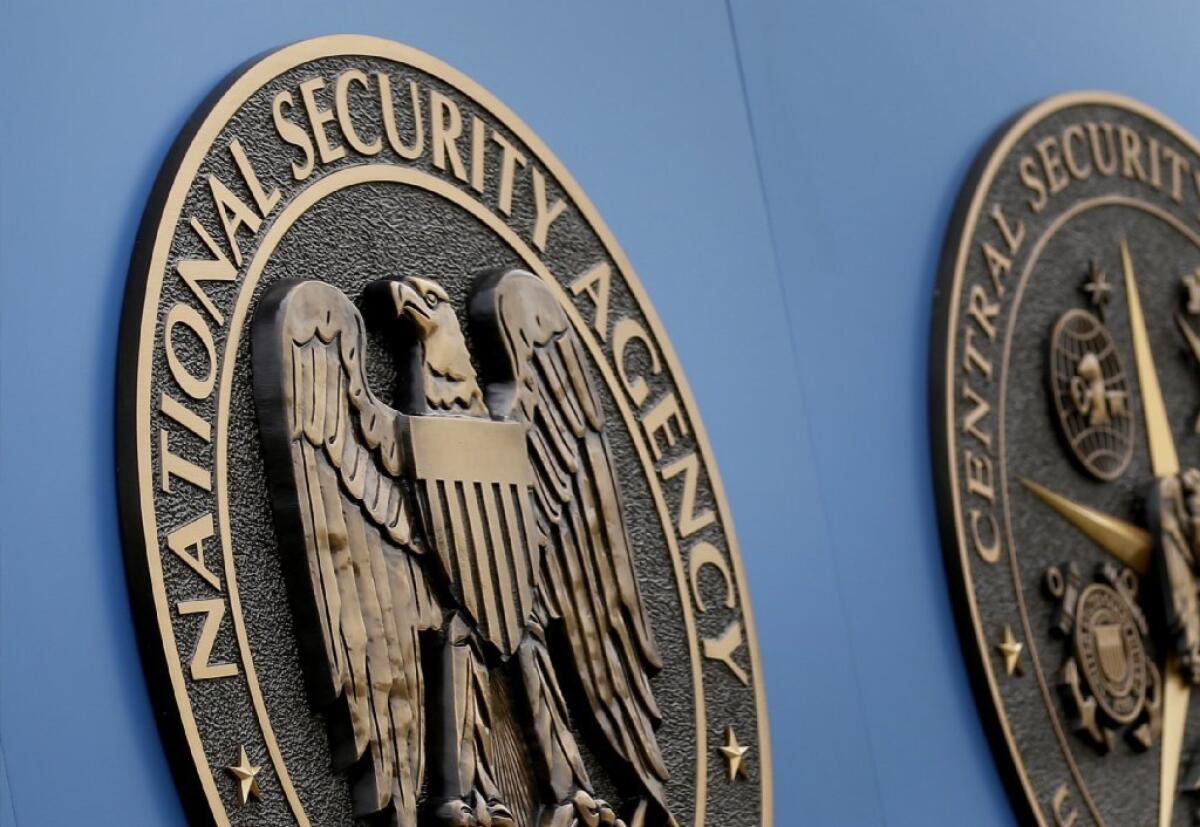Editorial: A first step in reining in the NSA

A sign outside the National Security Agency campus in Fort Meade, Md.
- Share via
A little more than a year after former National Security Agency contractor Edward Snowden revealed that the federal government was collecting and storing the telephone records of millions of Americans, Congress is poised to end the program and provide significant protection for a broad range of personal information sought by government investigators.
Sen. Patrick Leahy (D-Vt.), the chairman of the Senate Judiciary Committee, has proposed a version of the bill that is significantly more protective of privacy than one passed by the House in May. Like the House bill, Leahy’s proposal would end the NSA’s bulk collection of telephone “metadata” — information about the source, destination and duration of phone calls that investigators can “query” in search of possible connections to foreign terrorism.
But the Senate version, worked out in negotiations with the White House and civil liberties groups, imposes stricter limits on the search terms used to obtain not only phone data but other records as well. For example, the bill makes it clear that the government may not use a search term that would collect all information relating to a particular service provider or a broad geographic region denoted by a ZIP Code or area code.
The Leahy bill contains other reforms, including a requirement that the government provide periodic reports about the number of individuals whose information has been collected under various programs. It also would change the rules governing the Foreign Intelligence Surveillance Court, which interprets the law in secret, usually with input only from government lawyers. Under the Leahy bill, the court, in consultation with the Privacy and Civil Liberties Oversight Board, would appoint no fewer than five lawyers who would “advocate, as appropriate, in support of legal interpretations that advance individual privacy and civil liberties.”
Finally, the bill provides for the declassification and publication “to the greatest extent practicable” of opinions by the Foreign Intelligence Surveillance Court and its appellate arm, the Foreign Intelligence Surveillance Court of Review.
Important as it is, the Leahy bill addresses in only minor ways the collection of information about Americans as a byproduct of the electronic surveillance targeting foreigners living abroad. Unlike the collection of telephone metadata, these activities capture the actual contents of phone conversations, emails and social media postings, meaning that if an American is in contact with a friend or relative abroad, his private musings can be swept up in the electronic dragnet. That creates the possibility of “backdoor” surveillance of Americans without the individual warrants required by the 4th Amendment.
A panel appointed by President Obama recommended that information about Americans incidentally collected in foreign surveillance be “purged upon detection” unless it has foreign intelligence value or is necessary to prevent harm to others. Information about a U.S. citizen or permanent resident couldn’t be used in a legal proceeding against him, under another proposal by the panel. Leahy has indicated that once his legislation — known as the USA Freedom Act — becomes law, he will turn his attention to reforms in foreign surveillance programs that implicate the privacy of Americans. When he does so, he should consider the review group’s recommendation.
For all its limitations, the USA Freedom Act is a testimony to the importance of informed public debate. Whatever one thinks of Snowden, his disclosures brought into the open a dramatic expansion of government power that had never been discussed openly by the people’s representatives. As a result of his disclosures, liberal Democrats in Congress joined libertarian Republicans in pushing back against an overweening national security establishment.
Even Obama was affected. Initially, he defended the phone records program, assuring Americans that “nobody is listening to your telephone calls.” Eventually, however, he endorsed an end to the bulk collection program. His signature on the bill should be the beginning, but not the end, of an overdue recalibration of the balance between national security and personal privacy.
Follow the Opinion section on Twitter @latimesopinion
More to Read
Sign up for Essential California
The most important California stories and recommendations in your inbox every morning.
You may occasionally receive promotional content from the Los Angeles Times.













